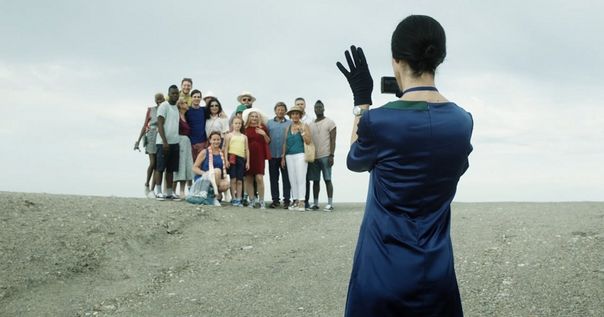Future, Perfect
Victor Morozov

The Greek short film THE FOREST / TO DASOS (2018) by Lia Tsalta follows a group of tourists wandering about what appears to be a huge aseptic facility. They move across corridors and visit several rooms in sheer discipline, as they are being guided by a funny, robotic-like woman. The tour sets off in the usual manner, as some ordinary-looking visitors glued to their cameras climb into a minibus. The guide assures them they will have the adventure of their lifetime – and, since we are talking about a regular bus tour, we can already feel that something is fishy. As it turns out, the tour revolves around a laboratory where scientists attempt to recreate various forms of life. The participants (mingled from all races) gaze at tree leaves or pigeons as if they are miracles of nature. Thus, little by little, we understand that the movie speaks about a post-apocalyptic world. At one moment, the guide praises the scientists’ efforts to create a revolutionary plant that changes when touched – the mimosa. When the group finally reaches the last existing real forest, everyone’s emotions are being unleashed in explosions of joy and liberation, filmed in slow-motion.
Of course, given the eerie and apparently visionary plot, the film feels perfectly embedded within the context of the so-called Greek Weird Cinema, internationally recognized mainly by the works of Yorgos Lanthimos. THE FOREST director Lia Tsalta makes good use of the almost clinical locations, and, just like Lanthimos, she projects a good deal of irony towards her characters. The shots are intentionally geometrical and capture the tourists’ trivial reactions – by the time the slow motion intervenes, we feel that she intelligently constructs the movie as a sort of TV advertiser for the last attraction in town. And while the action reveals itself as a big farce, the masquerade that it points to does not lack reflection. The film’s discourse is easy to assimilate and incisive at the same time. Similarly to Lanthimos’ latest English-language existential fables, everything relates to a dystopian future. While a movie like THE LOBSTER (2015) speculated around man’s increasing disability to interact with one another, THE FOREST clearly alludes to the careless attitude towards nature, which hints at certain consequences. Generally speaking, the movie allows enough subtlety to enter its universe, while at the same time the critique of bourgeois, self-indulgent society, portrayed under the form of stupid, all-alike individuals who simply cannot grasp the significance of what they see, is pretty sharp. Add to that the tutelary figure of the guide who can only recite readymade answers, and you can see that humanity – as nature – is having a hard time.
Nevertheless, on the whole it feels as if the rigid, cynical, and ferocious capitalism that the movie tries to denounce is not matched by equally piercing directing ideas. Everything looks unintentionally recycled, from the weird style that one more or less expects from recent Greek movies, to the subject it criticizes – the unflattering image of the consumerist tourist having been commonplace for years. One could say that, rather than rightly proposing a daring critique of the system, the movie fails to explore a more provocative portrait of decayed humanity and stays on the surface. Whether this is an intentional gimmick because of the short’s topic or pronounced personal style is to be seen in her future work.

